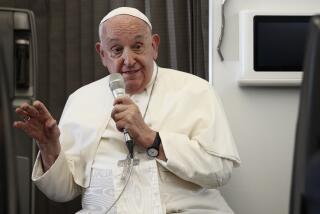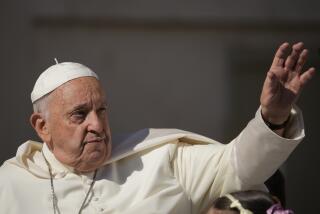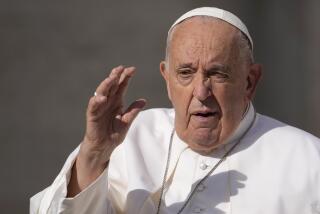Pope Francis’ accepting comments on gays mark change in tone
RIO DE JANEIRO — First, the pope used the word “gay.” Then he used a phrase possibly never heard from a pope: “Who am I to judge?”
His first overseas trip behind him, Pope Francis made surprisingly conciliatory remarks about the role of gay people in the Roman Catholic Church and his willingness to accept them uncritically, touching off a worldwide debate over how big a shift the new pontiff was endorsing.
He also spoke of finding more roles for women in the church — though not priesthood — and of showing mercy to divorced Catholics. And he spoke candidly of some of the scandals plaguing the Vatican, one of his greatest challenges.
The comments came aboard the pope’s flight home from Rio de Janeiro, where he presided over enormous crowds of enthusiastic followers. Before landing in Rome on Monday, he spoke to journalists for nearly an hour and a half, an access and exchange that the Vatican press corps has not seen in years. His remarks were widely reported by those on board.
Asked about a supposed “gay lobby” of Vatican officials, Francis said he did not approve of any kind of lobby, but it was important to distinguish between that and priests or other Catholics who might simply be gay.
Then, he seemed to clear the way for gay priests, as long as they remain celibate.
“If a person is gay, seeks God and has goodwill, who am I to judge?” Francis said. “They should not be marginalized.”
The pope was not changing basic church tenet, which holds that “homosexual acts” are sinful. But he did sketch a more inclusive and compassionate church than has been held forth in recent years. Francis’ predecessor, Pope Benedict XVI, wrote in 2005 that men with “deep-seated homosexual tendencies” should be barred from ordination.
The issue of gay priests has been a divisive one for a long time in the church, with disagreement over how prevalent they are and whether homosexuality undermines celibacy. Advocates have argued that homosexuality does not limit a priest’s clerical abilities, while extremists at the other end of the debate, at the height of the church’s sexual abuse scandals, have gone so far as to erroneously conflate homosexuality and pedophilia.
Rev. James Martin, a prominent Jesuit commentator, said Pope Francis’ remarks constituted a giant step forward.
“Anyone who says nothing has changed in the church today is nuts,” Martin said on his Twitter account. “From ‘no gay priests’ in 2005 to ‘who am I to judge’ is a sea change.”
At least as meaningful as what the pope said was how he said it. He responded to every single question the reporters hurled at him, never flinching, answering with the same ease and directness that has marked his public speeches and won him many admirers.
Conservative Catholics, many of whom are increasingly put off by Francis’ accessibility and deliberate simplicity, sought to downplay the new remarks.
“He addressed the issue [of gays in the church] in a more frank way, but this is not a departure” from Catholic teachings, said Ashley McGuire, a senior fellow at the Washington-based Catholic Assn. The church, even in its less accepting times, has long maintained that gay people should not be discriminated against.
But the pope seemed to be going beyond that.
“Pope Francis was pointing out that Catholics with a homosexual orientation, honestly living out their faith and seeking God (as all Catholics should), are integral members of the church,” said Ramon Luzarraga, a theology professor at the Benedictine University of Mesa, Ariz. “They are not automatically part of some rumored fifth column seeking to change the church.”
The U.S.-based Human Rights Campaign, a major gay-rights organization, sent out a statement welcoming Francis’ comments as a “significant change in tone” but said the church still had a long way to go in welcoming gays, lesbians and transgender people into the Catholic fold.
The pope’s decision to give a wide-ranging news conference on his flight home, despite his clear exhaustion, stunned reporters on board. Benedict would deliver prepared answers to five or so pre-screened questions on his overseas flights, and John Paul II was too infirm in the last several years of his pontificate to interact with reporters.
The National Catholic Reporter’s John Allen referred to the session as a “whopper.” Andrea Tornielli of the Vatican Insider website said the pope further proved his ability to communicate, with no need for a spin doctor.
On women, Francis repeated the church position that they cannot be priests. “The door is closed” on that issue, he said, citing John Paul’s definitive ruling against the ordination of women. However, he added that women should have greater roles in administration within the Vatican and other church areas, and he called for a “theology of women” that has been missing.
“Let us remember that Mary is more important than the bishop apostles, so women in the church are more important than bishops and priests,” Francis said.
On the scandal-plagued Vatican bank, suspected of being used to launder millions of dollars, Francis said he would heed the advice of a five-member special oversight committee. But he said he did not know whether the bank could be saved or must be closed.
“Whatever the solution, it must have transparency and honesty,” Francis said.
The pope even took a question about reports that a senior aide had been engaged in gay trysts. Francis said he investigated and found no proof.
The famously humble Francis also said he was surprised when so much media attention focused on his practice of carting his own carry-on luggage onto the flight, both on its departure from Rome and takeoff from Rio.
What’s in the bag?
A couple of books, a diary, his razor, the pope said, adding, “No nuclear bomb.”
More to Read
Sign up for Essential California
The most important California stories and recommendations in your inbox every morning.
You may occasionally receive promotional content from the Los Angeles Times.











